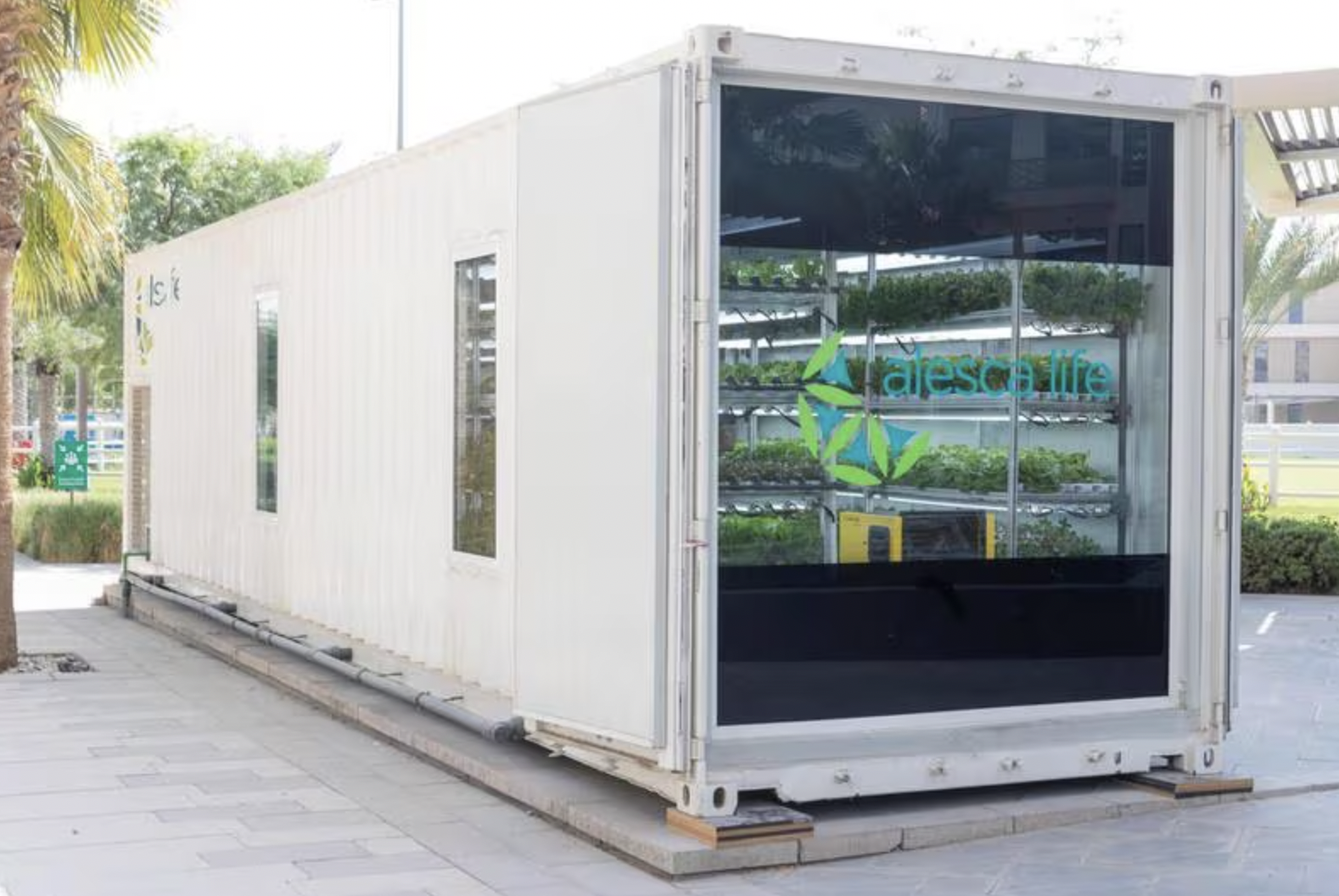Masdar City Launches Smart Vertical Farm With AgriTech Firm In Food Security Push
Alesca Technologies uses automated equipment and AI software to grow multiple varieties of fresh foods and herbs
Alesca's vertical smart farm in Masdar City is already operational. Photo: Masdar City
Feb 12, 2024
Masdar City, Abu Dhabi’s sustainability and innovation hub, has launched its indoor vertical farm with agricultural technology (AgriTech) firm Alesca Technologies, to help address food security challenges.
The project uses automated equipment and AI software to grow several varieties of fresh leafy greens, lettuce and herbs that are free of harmful chemicals and ready to eat.
The vertical farm will be housed in two repurposed shipping containers near Masdar City’s Eco-Plaza, the first of which is already up and running, with plans to expand the second in the coming year.
Once fully operational, the containers will generate upwards of 650 kilograms of leafy greens per month all year round.
Masdar City said the vertical farm, which uses 90-95 per cent less water than conventional farms, will be used to educate visitors about vertical farming as a solution to food security challenges.
The farm’s highly controlled and automated monitoring process helps maximise food production and minimise food waste.
“Partnership and experimentation are key to unlocking innovative climate change solutions and foundational to who we are at Masdar City,” said Sebastien Miller, Masdar City’s manager of the public realm.
Alesca's shipping container farm in The Sustainable City. Antonie Robertson / The National
“We’re glad to be partnering with a company like Alesca, which is known as a test bed for the localisation of food production and producing high-quality food, both of which play a role in addressing food security and related climate-change challenges.”
The Alesca indoor vertical farm also showcases the potential of multifunctional land use, which is particularly important in high-density cities.
“Transforming the agricultural industry requires collaborating with innovators across dozens of sectors, and we’re excited to accelerate our tech development and global impact by actively engaging with the Masdar City community,” said Stuart Oda, Alesca’s founder.
Alesca Technologies is part of Masdar City’s growing AgriTech cluster, including Dana, which is growing organic produce, Circa Biotech, which uses black soldier flies to turn food waste into organic animal feed and other products, and HydroArtPod,which brings organic vertical farming into homes.
Vertical farming has a significantly smaller carbon footprint than traditional agricultural methods.
READ MORE:
Dubai's Food Tech Valley and ReFarm to build a hi-tech gigafarm
ADQ's AgTech Park begins operations with opening of vertical farm
Vertical farming is on the up amid food security concerns, Dubai conference hears
It grows plants using mineral nutrient solutions in water and without the use of soil.
With 80 to 90 per cent of the UAE's food imported, greater emphasis has been placed on food security.
Last February, the world's biggest R&D vertical farm opened in Abu Dhabi. US vertical farming company AeroFarms opened a 6,000 square-metre R&D centre, the largest of its kind in the world, with the aim of advancing sustainable agriculture in arid climates.
In July 2022, Emirates Airline opened the world’s largest vertical farming plant in Dubai, a $40 million joint venture with US-based Crop One.
Bustanica, the 330,000 square-foot hydroponic farm near Al Maktoum International Airport (DWC), can grow more than a million kilograms of leafy greens annually, at a rate of about 3,000kg a day.
The UAE has launched several campaigns aimed at improving food security and reducing food waste.
In November, a nationwide campaign called Ne’ma was launched to reduce food waste, which is contributing towards achieving the UAE’s target of reducing food waste by 50 per cent by 2030.
A survey compiled by Ne’ma and the Behavioural Science Group in December revealed about 40 per cent of food is wasted in the UAE, costing Dh6 billion ($1.6 billion).
The How the UAE Eats: National Household Food Waste Survey 2023 surveyed more than 6,000 people and found 57 per cent admitted to ordering takeaways more than once a week.
The study said 38 per cent of people questioned reported over-ordering food, while only 53 per cent said they take leftover food home with them.





